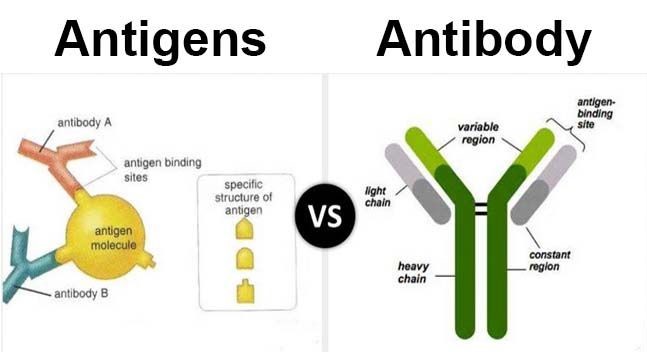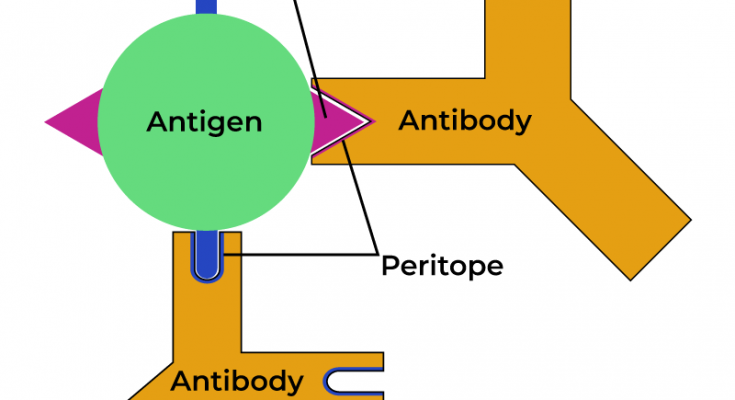Table of Contents
Antigens and Antibodies
Antigens are foreign substances, such as bacteria and viruses, that trigger an immune response. They can come from outside the body or, in some autoimmune diseases, from within the body itself. These substances are recognized by their specific structures, known as epitopes, which the immune system identifies as targets.
Antibodies, also termed immunoglobulins, are proteins produced by the immune system in response to the presence of antigens. Each antibody is specific to a particular antigen, binding to it through unique regions called paratopes. This binding helps to neutralise or eliminate the antigen, thereby protecting the body from infection and disease.
While antigens are often the cause of immune reactions, potentially leading to illness, antibodies work to counteract these effects by targeting and neutralising the antigens. The interaction between antigens and antibodies is fundamental to the immune response, playing a critical role in the body’s ability to maintain health and resist infections.
8 Differences Between Antigens and Antibodies in tabular format
| Aspect | Antigens | Antibodies | |
|---|---|---|---|
| 1 | Terminology | Also known as Immunogens | Also known as Immunoglobulins |
| 2 | Molecular Type | Can be lipids, proteins, carbohydrates, or nucleic acids | Exclusively proteins (glycoproteins) |
| 3 | Role | Cause allergic reactions or illnesses by inducing an immune response | Protect against antigens through lysis or immobilisation |
| 4 | Binding Site | Epitopes- Regions where antigens interact with antibodies | Paratopes- Variable regions that bind to epitopes |
| 5 | Origin | Originate outside the body (e.g., bacteria, viruses) | Always originate within the body, produced by B lymphocytes |
| 6 | Types | Heteroantigens (foreign) and Autoantigens (self, in autoimmune) | IgG, IgM, IgA, IgE, IgD, each with unique functions in immune response |
| 7 | Function & Specificity | Activate white blood cells to produce antibodies; diverse in nature | High specificity, each targets a unique antigen; neutralise/eliminate antigens |
| 8 | Immune Actions | Initiate immune reactions, potentially leading to sickness | Engage in tagging, neutralising, and eliminating antigens to stop infections |
Differences Between Antigens and Antibodies Explained in details

Difference Between Antigens and Antibodies in terms of Terminology-
- Antigens (Immunogens)– These are substances that the immune system recognizes as foreign. This recognition triggers an immune response. The term “immunogen” is used because these substances can generate (or “immunise”) an immune response.
- Antibodies (Immunoglobulins)- These are Y-shaped proteins produced by the immune system to specifically recognize and bind to antigens. The term “immunoglobulin” is derived from their role as globular proteins involved in immunity.
Difference Between Antigens and Antibodies in terms of Molecular Type-
- Antigens- They have a varied molecular structure and can be composed of proteins, lipids, carbohydrates, or nucleic acids. This diversity allows a wide range of substances, from parts of microorganisms to food proteins, to act as antigens.
- Antibodies– They are strictly proteins, more specifically glycoproteins. This means they are made up of amino acid chains with carbohydrate groups attached, which are crucial for their diverse functions and specificity.
Difference Between Antigens and Antibodies in terms of – Role in Immune Response-
- Antigens- By their presence, antigens pose a challenge to the immune system, potentially leading to allergic reactions or illnesses if the immune system recognizes them as harmful.
- Antibodies- They serve as the immune system’s countermeasure against antigens, neutralising or marking them for destruction, thereby protecting the body.
Difference Between Antigens and Antibodies in terms of – Binding Sites-
- Antigens- They possess epitopes, which are specific molecular patterns that antibodies recognize and bind to. An antigen can have multiple epitopes, allowing it to be targeted by different antibodies.
- Antibodies- The binding sites on antibodies are called paratopes. These are highly variable regions that allow antibodies to specifically bind to a vast array of epitopes on antigens.
Difference Between Antigens and Antibodies in terms of – Origin-
- Antigens- Typically, antigens come from outside the body, such as from pathogens (viruses, bacteria) or environmental sources (pollen, toxins). However, in autoimmune diseases, the body’s own molecules can become antigens.
- Antibodies- They are always produced internally by the body’s B lymphocytes as part of the adaptive immune response. Their production is a direct response to the presence of antigens.
Difference Between Antigens and Antibodies in terms of – Types-
- Antigens- They can be categorised based on their source, such as heteroantigens from foreign sources like pathogens, and autoantigens produced by the body itself in autoimmune diseases.
- Antibodies- There are several classes, including IgG, IgM, IgA, IgE, and IgD. Each class has a different role, such as IgG providing long-term immunity and IgE being involved in allergic responses.
Difference Between Antigens and Antibodies in terms of – Function & Specificity-
- Antigens- Their main function is to trigger an immune response. They vary greatly in structure, allowing a broad range of substances to serve as antigens.
- Antibodies- Each antibody molecule is specific to a particular antigen or, more precisely, to a specific epitope on an antigen. This specificity enables the immune system to target and neutralise a wide array of pathogens.
Difference Between Antigens and Antibodies in terms of – Immune Actions-
- Antigens- By stimulating the immune system, antigens can lead to various immune reactions, some of which might result in illness if the body fails to effectively neutralise the threat.
- Antibodies- Their actions include tagging antigens for destruction, neutralising them to prevent them from infecting cells, or directly eliminating them, thereby stopping infections and providing immunity.
Frequently asked Question On Difference Between Antigens and Antibodies
What are antigens, and how do they function in the immune response?
- Answer – Antigens are foreign substances that trigger the immune response in the body. They can be bacteria, viruses, or other foreign molecules that, when detected by the immune system, stimulate the production of antibodies to fight off the potential threat.
Describe the structure and function of antibodies.
- Answer – Antibodies, or immunoglobulins, are Y-shaped proteins produced by the immune system in response to antigens. Their primary function is to identify and neutralise foreign objects like bacteria and viruses. Each antibody is specific to a particular antigen, binding to it through the antibody’s variable region to help remove it from the body.
Differentiate between epitopes and paratopes.
- Answer – Epitopes are the specific parts or regions of an antigen that are recognized by and bind to antibodies. Paratopes, on the other hand, are the binding sites on an antibody that specifically recognize and attach to an epitope on an antigen.
Explain the origins of antigens and antibodies.
- Answer – Antigens typically originate from outside the body, such as pathogens (bacteria, viruses) or environmental substances (pollen, toxins). Antibodies are produced internally by the body’s immune system, specifically by B cells, as a response to exposure to antigens.
How do antibodies protect the body from antigens?
- Answer – Antibodies protect the body by binding to antigens, neutralising them, or tagging them for destruction by other immune cells. This process helps prevent the antigens from infecting cells and causing disease.
What are the main differences in the molecular composition of antigens and antibodies?
- Answer – Antigens can be composed of various molecular structures, including proteins, lipids, carbohydrates, and nucleic acids. Antibodies, however, are always proteins (more specifically, glycoproteins).
Describe the types of antigens.
- Answer – There are several types of antigens, including heteroantigens (foreign substances like viruses and bacteria) and autoantigens (self-antigens, which are normally present in the body but may be involved in autoimmune diseases).
List and explain the functions of different types of antibodies.
- Answer – There are five main classes of antibodies- IgG (provides long-term protection and is abundant in plasma), IgM (first antibodies produced in response to an antigen), IgA (found in mucous membranes and body fluids), IgE (involved in allergic reactions and protection against parasites), and IgD (plays a role in the activation of B cells).
How do antigens cause an immune response?
- Answer – Antigens cause an immune response by being recognized as foreign by the body’s immune system, leading to the activation of white blood cells (lymphocytes), which then produce antibodies to target and neutralise the antigens.
What role do antibodies play in vaccines?
Answer – Vaccines contain antigens or parts of antigens that stimulate the immune system to produce antibodies without causing the disease. These antibodies provide immunity by preparing the immune system to recognize and fight the actual pathogen if exposed in the future.

